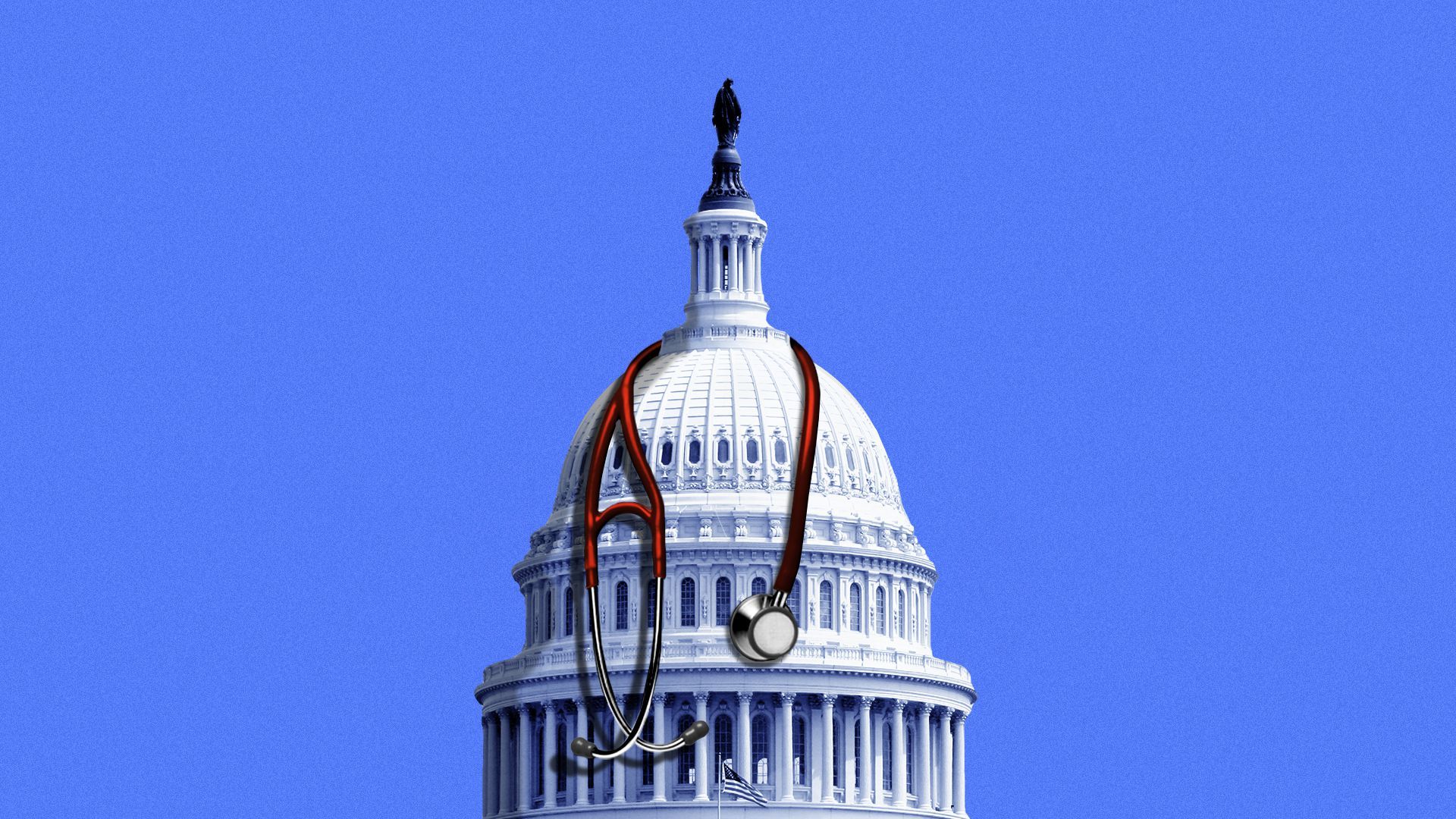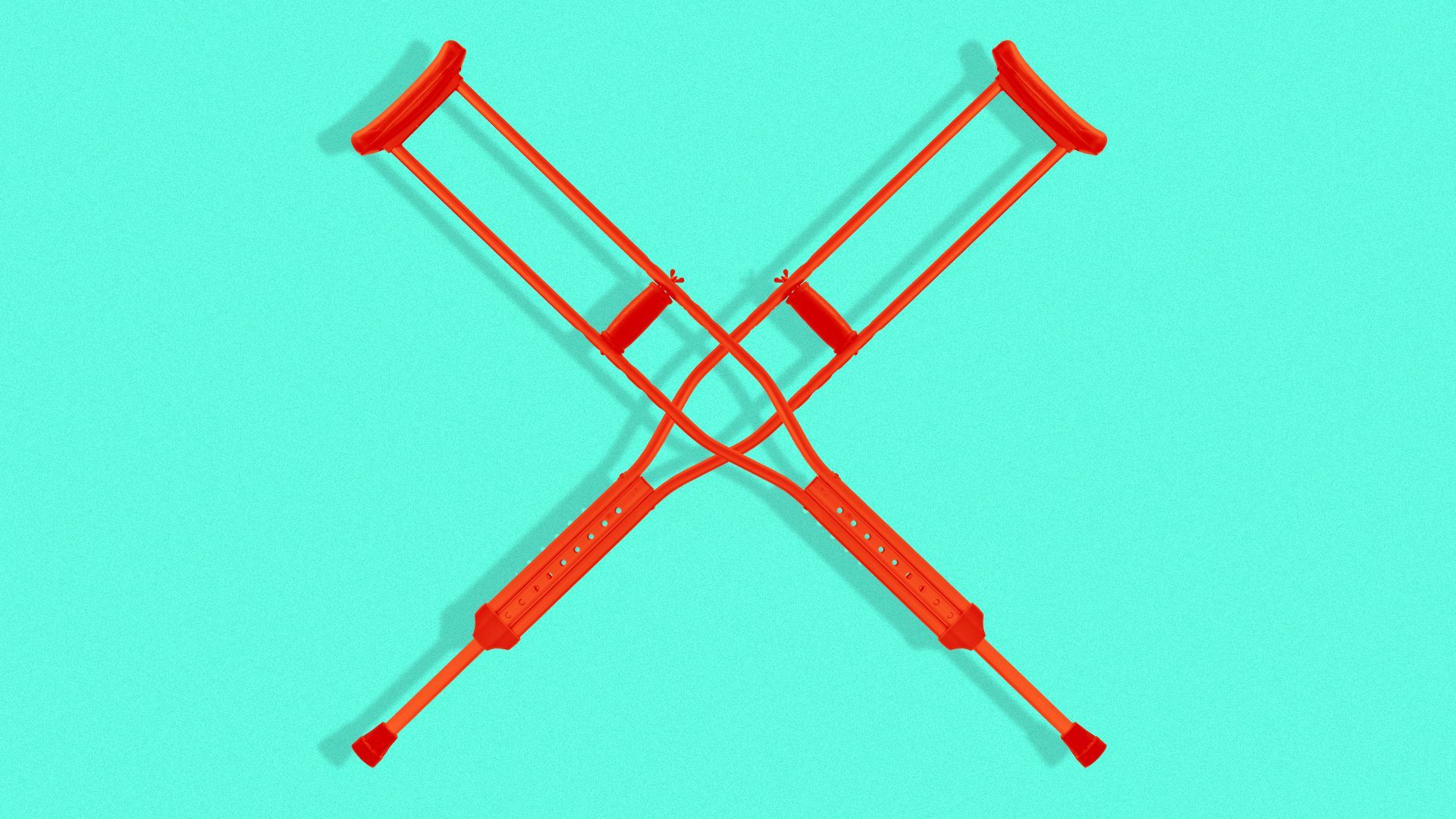| |
| |
| |
| Presented By PhRMA |
| |
| Axios Vitals |
| By Tina Reed ·Oct 26, 2021 |
| ☔️ Good morning, Vitals readers. Today's newsletter is 1,003 words or a 4-minute read. Situational awareness: A key FDA advisory committee will discuss Pfizer-BioNTech's request to administer their COVID-19 vaccine to kids ages 5- to 11-years-old today. |
| |
| |
| 1 big thing: Crunch time on Capitol Hill |
 |
|
| Illustration: Sarah Grillo/Axios |
| |
| As Democrats try to reach a deal on a massive social policy bill, the legislation's health care measures are emerging as key sticking points, Axios' Caitlin Owens writes. Between the lines: Moderate Democrats have successfully reduced the amount of new spending that the party is aiming to pass, amplifying the tug-of-war within the party over which health policies to prioritize. The big picture: Nothing's dead yet, although some big-ticket health items are definitely in hot water. - Now that Democrats will be spending less, they also need to raise less revenue — which alleviates some of the pressure to be more aggressive on drug pricing provisions.
- If the Senate reaches a compromise on allowing Medicare to negotiate drug prices, it'll likely apply to fewer drugs than the House bill and use a domestic benchmark price, instead of pegging U.S. prices to what other countries pay.
What they're saying: When Rep. Kurt Schrader — who voted against the House's drug pricing plan in committee — was asked whether he sees some form of Medicare negotiations making it into the bill, he told STAT's Rachel Cohrs that he'd "bet the ranch on it." Where it stands: The most vexing policy area appears to be Medicare benefit expansion. Progressives who want the program to cover hearing, dental and vision benefits are running into Sen. Joe Manchin's brick wall of opposition. - Manchin has said he's worried about the Medicare program's solvency.
- Neither side seems to be backing down, although the idea of vouchers has gained momentum over strict benefit expansion.
The bottom line: There's going to have to be a lot of give and take in the coming days if any of Democrats' priorities are going to become law, health care or not. Go deeper. |
    |
| |
| |
| 2. Crutches are the latest supply chain shortage |
 |
|
| Illustration: Sarah Grillo/Axios |
| |
| An aluminum shortage has led to a new medical supply shortage: crutches. Why it matters: This supply-chain issue could become a much bigger problem in the next couple of months which are typically the busiest time of the year for orthopedic surgeries. Driving the news: Delays due to worker shortages in China's ports are mostly to blame for the backlog, said Kim Anders, group vice president for strategic supplier engagement at the group purchasing organization Premier. State of play: Some hospitals have begun asking their communities for donations. The bottom line: "December is when we're going to start seeing some relief," Anders said. Share this story. |
    |
| |
| |
| 3. Axios-Ipsos poll: COVID unease deepens |
 Data: Axios/Ipsos poll; Chart: Kavya Beheraj/Axios Confidence in President Biden's ability to rescue the economy from COVID-19 has dropped even as Americans' faith rises in his ability to make the vaccine widely accessible, Axios' Margaret Talev writes from the latest Axios/Ipsos Coronavirus Index. What they're saying: Biden's messaging is "focused on the wrong problem" from a confidence-building perspective, said Cliff Young, president of Ipsos U.S. Public Affairs. - "The problem is convincing those who are vaccinated that they have the tools to navigate a COVID world ... [and reassuring] those who've been vaccinated that they can live a normal life again."
Between the lines: Large shares of Americans are still in the dark about the basic science, the survey shows. - For instance, six in 10 Americans either incorrectly believe that unvaccinated people and vaccinated people are equally likely to test positive for the virus, or said they don't know.
Their confusion could deepen their unease, Ipsos pollster and senior vice president Chris Jackson said. - "There's this huge mushiness about who's protected, how much they're protected," he said.
Go deeper. |
    |
| |
| |
| A message from PhRMA |
| The cost of medicine needs to be predictable and affordable |
| |
 |
| |
| A majority of patients said they would prioritize lowering out-of-pocket costs over insurance premiums. In fact, 3 in 10 Americans who have insurance still face a financial barrier to care. Fixing health care means putting patients first. Learn more from the Patient Experience Survey. |
| |
| |
| 4. Challenges ahead for new PBM competitors |
 |
|
| Illustration: Aïda Amer/Axios |
| |
| Winning over employers is the biggest hurdle facing two new drug benefits companies — one created by billionaire Mark Cuban's startup drug firm and another created by a coalition of large employers. Why it matters: The projects won't go far if major employers don't shift their business away from the dominant incumbents to these new firms, Axios' Bob Herman writes. The big picture: Express Scripts, CVS Caremark and OptumRx control roughly 80% of the market. Yes, but: Large companies like Boeing, Disney, Intel and Walmart make up the Purchaser Business Group on Health, which is starting a PBM called EmsanaRx. - "The industry has really been unresponsive to their concerns," said Elizabeth Mitchell, PBGH's CEO.
- PBGH can't force its member companies to end or switch their PBM contracts, but the group is "very encouraged" about winning employers during open bids, Mitchell said.
The bottom line: These new companies are looking to strip away the games within drug pricing contracts, like rebates and spread pricing. - There's a big appetite for change, but success ultimately will depend on employers ditching the current oligopoly.
|
    |
| |
| |
| 5. Lack of paid leave tied to food insecurity |
 Data: Health Affairs; Chart: Danielle Alberti/Axios Lack of paid medical leave during the COVID-19 pandemic has been tied to greater food insecurity, Axios' Marisa Fernandez writes, citing a report out in Health Affairs on Monday. By the numbers: Census data showed workers earning less than $50,000 were more than four times as likely as workers earning $100,000 or more to report missing a whole week of work due to COVID-19 last year. - The lack of paid leave benefits corresponded with higher levels of food insufficiency, or not having enough food to eat in the past week
- "Being forced to miss an entire week without pay could result in a substantial lack of food," the authors wrote.
Read more. |
    |
| |
| |
| 6. Catch up quick |
- White House: We don't have "unlimited rights" to Moderna vaccine recipe. (Washington Post)
- Moderna says COVID vaccine shows strong immune response in kids. (Axios)
- Amazon brings Alexa to hospital rooms. (Fierce Healthcare)
- Biden administration announces plan to speed authorization of at-home COVID tests. (NBC News)
|
    |
| |
| |
| A message from PhRMA |
| The cost of medicine needs to be predictable and affordable |
| |
 |
| |
| A majority of patients said they would prioritize lowering out-of-pocket costs over insurance premiums. In fact, 3 in 10 Americans who have insurance still face a financial barrier to care. Fixing health care means putting patients first. Learn more from the Patient Experience Survey. |
| |
| Not a subscriber yet? Here's how to sign up. |
 | | It'll help you deliver employee communications more effectively. | | |










No comments:
Post a Comment